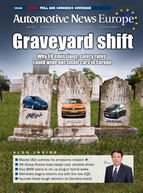The blame game over the breakdown of Fiat Chrysler Automobiles and Renault's 35 billion-euro ($39 billion) merger will soon pass. The enduring question is whether the two automakers have better options than combining with each other. Returning to the table still looks like the least painful way forward.
FCA walked, citing French politics. Its 50:50 merger proposal was clearly not far from being an acceptable deal. The terms offered a financial premium and pledges to safeguard jobs, while identifying savings for Nissan, Renault's existing partner. FCA has to protect its own shareholders -- its withdrawal reminds the world they matter, too -- but the automaker was wise to leave the door slightly ajar.
Neither FCA nor Renault have a plan B that looks quite as attractive industrially. For the former, the alternative European move looks to be a merger with PSA Group. Crunch the two together at today's market values and PSA's shareholders would own 51 percent of the combination, giving them a smidgen more of the value creation and the impression of getting the better side of the deal. Paris might feel that is an easier transaction to sell to the French public. especially as FCA's average market value over the last six months has been slightly higher than PSA's.
Yet it's hard to believe that PSA would be a better cultural fit than Renault. That is a paramount consideration for a complex merger integration. FCA's talks with Renault evolved speedily from an initial discussion about an industrial partnership. Even if you didn't believe the companies would ever fully achieve the 5 billion euros of annual synergies FCA identified, the benefits would be still be considerable. What's more, Renault's alliance with Nissan means the scope for savings could be well beyond what might be possible with PSA.
For Renault, a transaction with FCA remains the most credible near-term way of narrowing the discount to its theoretical value. If you subtract the value of the French automaker's stake in Nissan, its cash and other investments, shareholders put no value whatsoever on its actual business of making vehicles.
True, Renault has the possibility of expanding industrial ties, and possibly merging, with Nissan. But it cannot ignore the market reaction to the FCA proposal. Shares of Renault, FCA and PSA are all up slightly from where they were before talks leaked 12 days ago, baking in some lingering hope of consolidation. Renault stock, however, is up the most. That might be the market waking up to its undervaluation. More likely, it's a recognition of what the company stands to gain if consolidation remains possible.
Choreographing a comeback will not be easy. This is a battle to be the master of Renault while making a transaction look like a merger of equals. Any final agreement would probably have to look like it was brokered by Paris. What will matter for investors is whether continued government interference prevents decisions from being made on a commercial basis.
Under FCA's first proposal, the two companies would nominate four directors each. The French state would be excluded from the boardroom and see its voting rights fall from just under 30 percent to 7.5 percent, in line with its economic stake in the combined company. Giving it one of the four board seats, while still diluting its voting power, could be a tolerable a compromise to get a deal done. France's influence would still be reduced relative to today, which might just persuade Italy against trying to acquire a stake and a matching seat.
After all, France and Italy are going to make life difficult for these companies either way -- whether they are in the board room or not. Leave it to the market to punish the stock accordingly.

